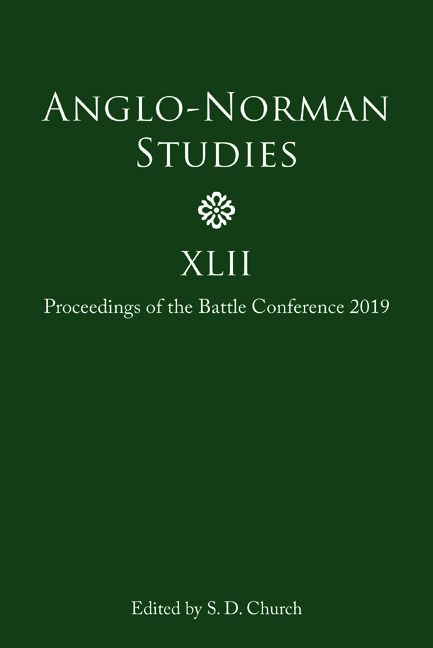Book contents
- Frontmatter
- Contents
- Illustrations and Tables
- Editor’s Preface
- Abbreviations
- Reassessing the Reign of King Æthelred the Unready: (The Allen Brown Memorial Lecture)
- The Art of Memory: The Posthumous Reputation of King Harold II Godwineson: (The Des Seal Memorial Lecture)
- Women, Memory and the Genesis of a Priory in Norman Monmouth
- The Sins of a Historian: Eadmer of Canterbury, Historia Novorum in Anglia, Books I–IV
- Angevin Rule in the West of Normandy, 1154–86: The View from Mont-Saint- Michel
- ‘A girly man like you can’t rule us real men any longer’: Sex, Violence and Masculinity in Dudo of Saint-Quentin’s Historia Normannorum
- Compiling Chronicles in Anglo-Norman Durham, c. 1100–30
- The Counts of Louvain and the Anglo-Norman World, c. 1100–c. 1215
- England, Normandy and the Ecclesiastical ‘New Law’ in the Later Twelfth Century
- Miscellaneous Endmatter
‘A girly man like you can’t rule us real men any longer’: Sex, Violence and Masculinity in Dudo of Saint-Quentin’s Historia Normannorum
Published online by Cambridge University Press: 14 October 2020
- Frontmatter
- Contents
- Illustrations and Tables
- Editor’s Preface
- Abbreviations
- Reassessing the Reign of King Æthelred the Unready: (The Allen Brown Memorial Lecture)
- The Art of Memory: The Posthumous Reputation of King Harold II Godwineson: (The Des Seal Memorial Lecture)
- Women, Memory and the Genesis of a Priory in Norman Monmouth
- The Sins of a Historian: Eadmer of Canterbury, Historia Novorum in Anglia, Books I–IV
- Angevin Rule in the West of Normandy, 1154–86: The View from Mont-Saint- Michel
- ‘A girly man like you can’t rule us real men any longer’: Sex, Violence and Masculinity in Dudo of Saint-Quentin’s Historia Normannorum
- Compiling Chronicles in Anglo-Norman Durham, c. 1100–30
- The Counts of Louvain and the Anglo-Norman World, c. 1100–c. 1215
- England, Normandy and the Ecclesiastical ‘New Law’ in the Later Twelfth Century
- Miscellaneous Endmatter
Summary
The first-ever written history of Normandy is a peculiar work. The Historia Normannorum – formerly known as the De Moribus et Actibus Primorum Normanniae Ducum, by which name the majority of previous scholarship refers to it – was written around the year 1000 by Dudo, a canon of the abbey of Saint-Quentin in the county of Vermandois. Despite his Frankish background, Dudo was closely entangled with Norman politics and culture for around three decades, a personal acquaintance of the ducal family, probably associated with the Norman schools and richly rewarded by the dukes. His work was commissioned by Duke Richard I of Normandy (r. 943–96), known as ‘the Fearless’, and after his death it was recommissioned by his son Richard II (r. 996–1026, known as ‘the Good’) and Ralph, count of Ivry, the elder Richard's half-brother. It is a lengthy work intertwining prose and poetry, the latter usually commenting on the action in the author's own voice. The Historia is the greatest product of the Latin literary culture of the Norman court at the turn of the millennium, a time and place whose unusual creativity in written composition caused Musset to bestow upon it the name of the ‘Ricardian Renaissance’. Although how much medieval historians need another renaissance may be questionable, the Historia's length, mannerist style and willingness to experiment with form and theme mark it out as one of the most important works of post-Carolingian history, if not indeed of earlier medieval history more generally.
However, as the last item in the list of its qualities may have hinted, it is a deeply eccentric book. As is no longer seriously disputed, Dudo was not writing a Viking saga but a work deeply rooted in his broad if not perhaps terribly profound learning, which came directly from a Frankish, Carolingian tradition. Despite this very traditional educational background – for he was probably educated in Liège or Laon – the Historia, although rooted in Carolingian ideas, goes in unexpected and even novel directions with them. This can be seen in its very subject, for it is the first Latin history of a non-royal aristocratic family, a type of work which was essentially unheard of before Dudo, and remained extremely rare for a century afterwards.
- Type
- Chapter
- Information
- Anglo-Norman Studies XLIIProceedings of the Battle Conference 2019, pp. 101 - 118Publisher: Boydell & BrewerPrint publication year: 2020



